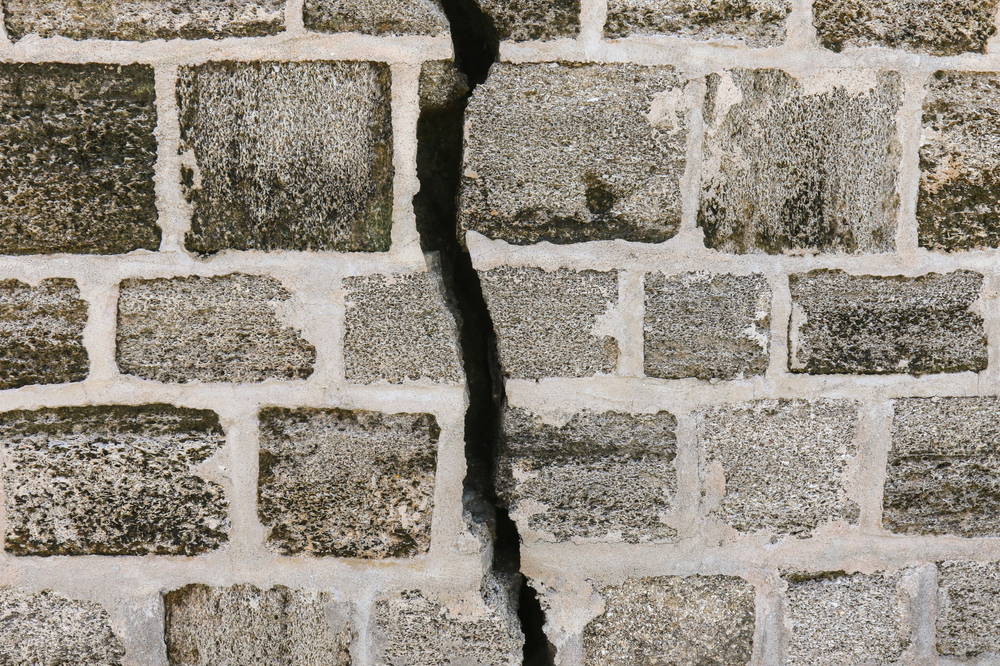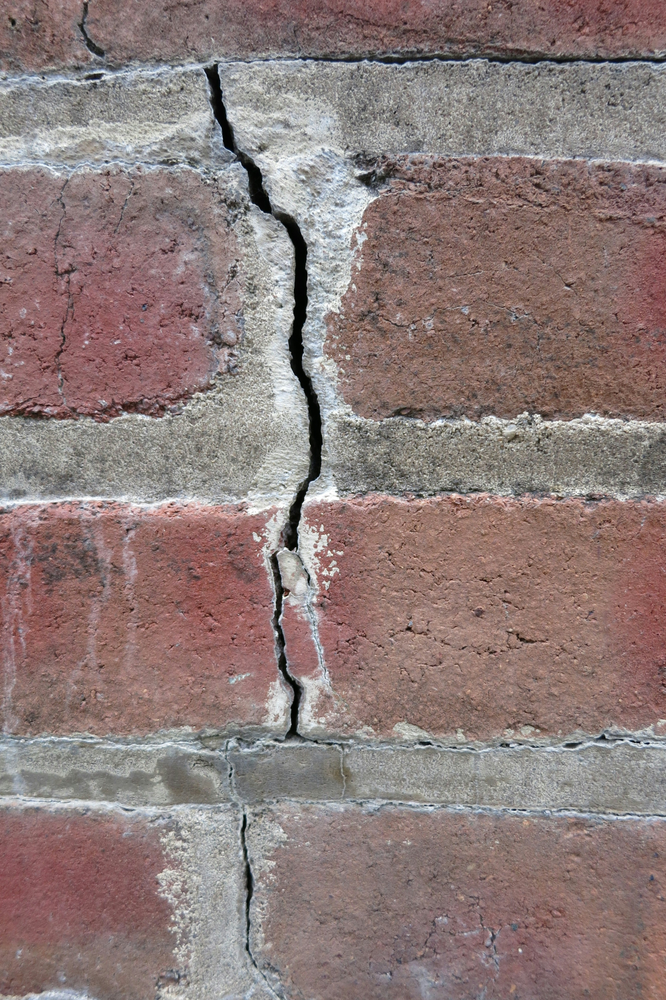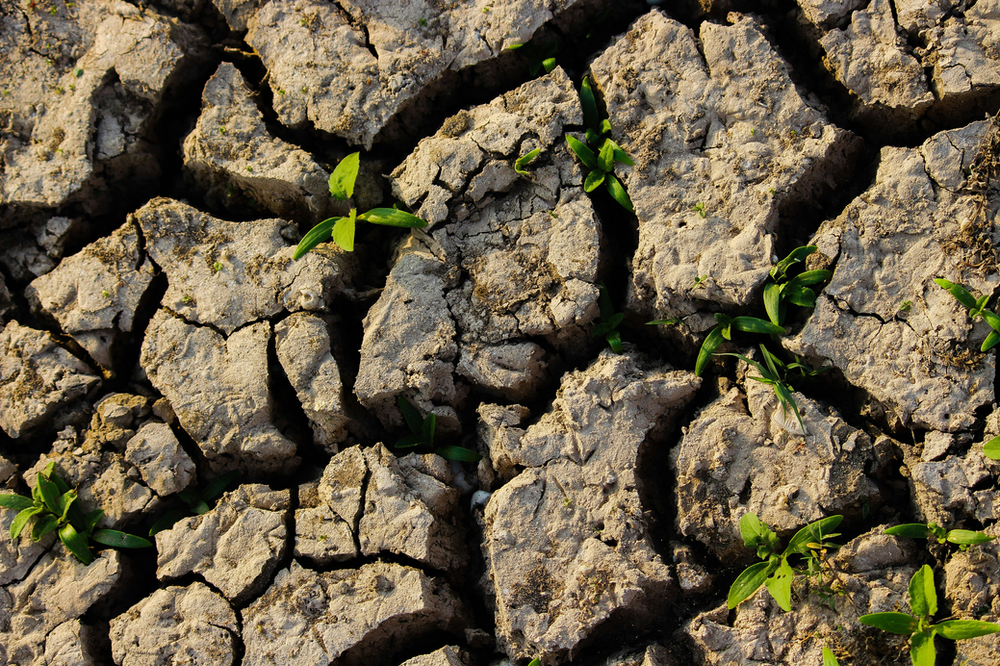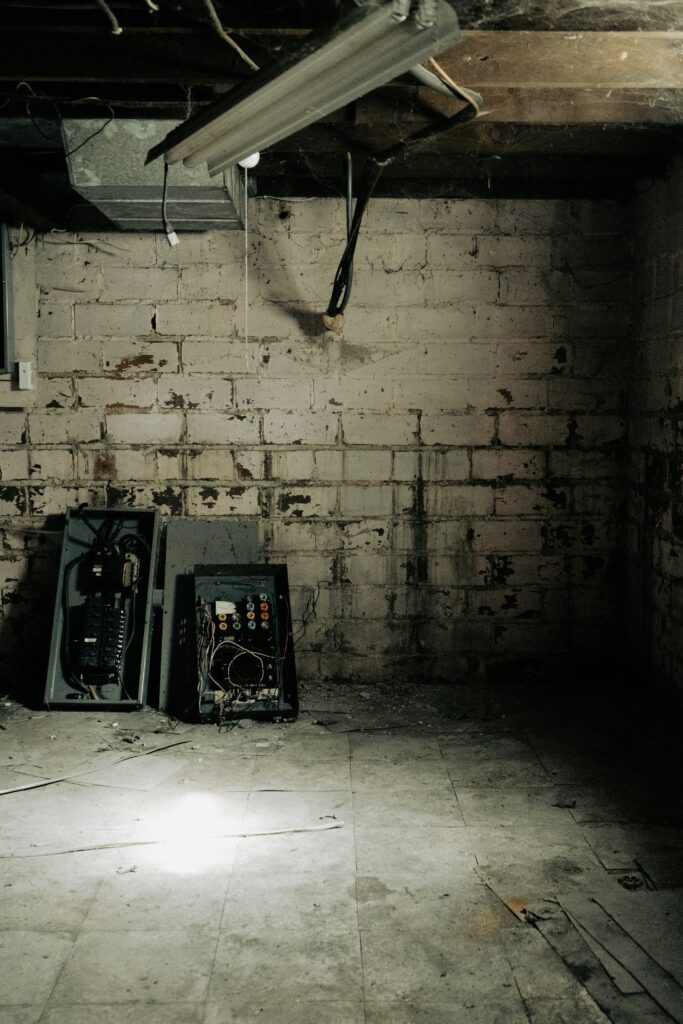Last Updated on June 14, 2024 by John Coleman
Have you noticed new cracks in the exterior walls of your home, gaps between the crown molding and your floor or ceiling, or perhaps unlevel floors? You are likely wondering what has caused this to happen, should you be concerned, and what can you do to get it fixed. In some cases, this could be an indication that you need home foundation repair.
Each year, many homeowners notice subtle changes in the interior and exterior of their homes. Some of the most common changes include cracked interior/exterior walls and floor tiles, gaps between the walls and the floor or ceiling, as well as, doors and windows that stick. It is important to determine if this is related to typical settling or signs of a more serious foundation issue that could cause further damage. The best response is to get it inspected as soon as possible. If the inspection reveals that it is due to normal settling….that’s great! However, if more serious problems are identified, you have caught the problem early and likely avoided costly and more serious damage to your home. In this article, I will share essential information you need to know that will help you navigate the process of home foundation repair. By the end, you will have a basic understanding of what causes foundation issues, how to get it checked out, what solutions are available, and how to get it fixed to put your mind at ease so you can move on to more important things in your life.

If you purchase through links on this site, we may earn a small commission. See our affiliate disclosure.
Your home’s foundation is its cornerstone; it keeps the building sturdy and secure. Unfortunately, foundation issues aren’t uncommon, and they can be a homeowner’s worst nightmare. Knowing the essentials of home foundation repair is crucial for maintaining the integrity and value of your property. Whether you’re a DIY enthusiast looking to expand your knowledge or a homeowner seeking to understand the complexities of your home, this comprehensive guide will walk you through everything you need to know.
What is Home Foundation Repair?
Home foundation repair entails identifying and resolving issues concerning a home’s foundation. These issues may encompass cracked walls, floor tiles, gaps between walls and ceilings, and doors and windows that exhibit resistance. While certain problems may stem from the natural settling of the property, others could signify underlying foundation concerns that, if neglected, might result in escalated damage.
The Crucial Role of a Solid Foundation
The foundation of your home is the most critical element of its structure. It provides a level surface upon which your home is built, transferring the weight of the building to the ground. A strong, healthy foundation is essential for a safe, structurally sound home. However, as with any part of your property, it can be affected by a range of factors from natural settling to more severe issues which could compromise your home’s stability.
Understanding the signs of foundation problems, their underlying causes, the repair process, and even what it may cost you can provide clarity and peace of mind as you navigate this significant aspect of homeownership.
Recognizing Foundation Issues
Foundation problems can manifest in various ways, and early recognition is key to effective resolution. Here are common signs of foundation issues that homeowners should look out for:
Visual Defects

Cracks in walls, ceilings, or floor tiles
Stair-step cracks in brick or masonry
Uneven floors, often sloping or sagging
Standing water or excessive moisture in your crawlspace
Functional Symptoms
Doors or windows that suddenly stick or no longer latch correctly
Gaps between walls, floors, or ceilings
Bowing or leaning basement walls
Indications of Sinking
Exterior foundation cracks
Settling or sinking of the building on one side
Cracks in your walkways or driveway
Identifying and addressing these signs with prompt solutions can prevent further damage, saving you both money and the structural integrity of your home.
Diving Deeper into Causes
Understanding what leads to foundation problems can help you prevent them in the future. Common causes include:
Poor Soil Conditions

Expansive clay soils can swell and shrink with moisture changes, causing the ground to shift and potentially damage your foundation over time.
Water Damage
Poorly managed water around your foundation, or plumbing leaks, can lead to erosion of the soil and loss of support for your home.
Construction Quality and Water Vapor
Inadequate site preparation, improper drainage, or even high amounts of evaporation under your home can lead to settlement.
Natural Conditions
Natural events, like earth tremors or floods, can exert stresses on your home’s foundation, leading to damage that requires repair.
Assessing the soil, drainage systems, and past occurrences can help you target the potential causes of your home’s foundation issues.
Foundation Settling vs. Foundation Problems
It’s important to understand the difference between the natural settling of a home, which occurs over time, and more serious foundation problems that need immediate attention.
Foundation Settling
Minor cracks, especially those near doorways, are typical as a house settles over time. This type of settling rarely compromises the structure.
Serious Foundation Problems
Large, widespread, or rapidly appearing cracks, especially those that are accompanied by movement within the house, are signs of a more serious issue that requires professional assessment.
Recognizing the severity of the issue will guide your next steps in addressing the health of your home’s foundation.
If you purchase through links on this site, we may earn a small commission. See our affiliate disclosure.
The Cost of Foundation Repair
The cost of repairing your foundation can vary significantly depending on the level of damage and the repair methods required. Here’s what can influence the cost:
Inspection Costs
When it comes to getting your foundation inspected, there are a couple of good options. First, you could hire a structural engineer which can range from a few hundred dollars to over a thousand, depending on your location and the size of your home. According to HomeAdvisor, the average cost range to hire a structural engineer is $344 – $742. Another option is to utilize a company like Groundworks that offers a free foundation inspection to see if your home requires foundation repair. In my opinion, either of these resources are good options because the main goal is getting your home inspected by someone who has expertise in home foundations as soon as possible. Of course, there are many homeowners that prefer to get more than one opinion which is perfectly fine. In fact, if more than one inspection reveals similar findings and the recommendations align (or are similar), it will only reinforce the next step(s) you decide to take if repairs or modifications are suggested.
Repair Costs

Costs for repairs per se cover materials, labor, and any additional work needed, such as shoring up with additional piers or wall stabilization. The National Association of Realtors (NAR) cited a survey conducted by Groundworks that included 978 homeowners. Of that number, 605 experienced home foundation repair. These respondents also indicated the overall cost range of their repairs.
- 47% reported costs of $100 -$1000
- 35% reported costs of $1001 -$5,000
- 13% reported costs of $5001 -$10,000
- 5% reported costs of $10,000 or more
Is It Worth the Fix?
In some cases, the cost of fixing your foundation can be substantial. However, for many homeowners, it’s a worthwhile investment in the value and safety of their home. This is especially true if you plan to live in the home for a while or if a significant structural issue could jeopardize the sale of your home.
DIY vs. Professional Repair: Making the Call
Deciding whether to tackle foundation repair as a DIY project or to hire a professional is a crucial decision. Here are the factors to consider:
DIY Pros and Cons
DIY can save you money, but it’s not for everyone. You’ll need skills, time, tools, and knowledge of local building codes. Small, straightforward repairs are best for the DIY enthusiast with the right background. It is important to keep in mind that foundation problems will likely have underlying causes that can’t be seen. As a DIYer myself, I always like to have a good idea of what I am getting myself into. In this case, I would contact a nationwide reputable foundation repair company like Groundworks and schedule a free foundation inspection. It makes me feel a lot better knowing that a professional has looked at it. If they make recommendations, you may be able to take some of the work on yourself. For instance, they might recommend direct repair to your foundation that should only be performed by professionals because they have the knowledge, tools, materials, and skills. However, they may also recommend making modifications such as removing landscaping or installing something like a french drain to carry water away from your house which is something that may be within your skill set that you could save money doing yourself. Let Groundworks do the heavy lifting, and you can DIY the smaller stuff. The main point is, that you want this job done correctly.
When to Go Pro
If your foundation issues are extensive or impact the structural integrity of your home, it’s important to get professional help. Experienced contractors can provide expertise and guidance, along with warranties that can’t be matched by DIY solutions. I would also like to add that not only does Groundworks offer a free inspection but they also have a pricing guarantee of you getting the lowest price on repairs without compromising quality. It is stated on the Groundworks website,
“If a Licensed Class A contractor offers the same standard of materials, quality, and work of equal specification for a lower price than what our company quoted and within 30 days, we will match their written estimate, plus discount an additional $100 with your signed contract. “
They also stand behind their work with a nationally backed warranty and 100% satisfaction guarantee.
Regardless of the route you take, ensuring the foundation repair is done correctly is vital for maintaining your home’s value and safety.
Understanding Foundation Repair Methods
Several methods and techniques can be utilized to repair a home’s foundation. Here are some of the most common:
Slabjacking
This method involves lifting a concrete slab using a combination of grout and hydraulic pressure, typically to level the foundation.
Helical Piers (Screw Piles)
Piers with helical blades are screwed into the ground beneath your foundation, giving additional support where it’s needed to stabilize the structure.
Push Piers
These piers are used for foundation repair when the load-bearing soil is not strong enough to support the structure as is.
Slab Piers
Similar to push piers, these are installed beneath the concrete slab to support and stabilize your home.
Waterproofing
Dealing with water accumulation around your foundation is just as important as the structural aspects of repair. Proper waterproofing methods can prevent further issues.
Each method addresses different aspects of foundation repair, from leveling to stabilization, and their necessity depends on the type and severity of your home’s foundation issues.
Preventing Future Issues
Preventive maintenance is your home’s best line of defense against foundation problems. Here are some tips to help keep your foundation in top shape:
Indoors and Out
Check for leaks and drips regularly, and ensure your home’s drainage systems are functioning properly.
Landscaping and Drainage
Managing water flow by directing it away from your foundation can prevent erosion and the potential for settling.
Trees and Soil
Large trees too close to your home can have extensive root systems that dry out the soil, leading to shrinkage and potential settlement. These should be removed to protect your foundation.
Regular maintenance and smart planning can go a long way in protecting your home from future foundation woes.
Take Action and Protect Your Home
In every homeowner’s journey, the foundation is the bedrock of a safe, stable, and secure home. Armed with the right information and a proactive approach, you can fortify your home’s integrity against potential threats. Take charge by inspecting regularly, rectifying promptly, and safeguarding vigilantly. By doing so, you’re not only protecting your home but also securing your peace of mind. Share this guide with loved ones to spread awareness—because a strong foundation is not just the beginning of a robust home, it’s the start of a well-grounded life. Remember, the durability of your home rests in your hands. Follow the steps outlined in this article today and ensure your home stands strong for years to come.
Frequently Asked Questions
What questions should I ask a home foundation repair expert?
Some questions to ask a home foundation repair expert include:
- What caused the foundation issue?
- How long will the repair take?
- What methods will be used for the repair?
- Will there be any disruption to my daily routine during the repair process?
- Are there any potential risks or complications I should be aware of?
- How much will the repair cost and are there any financing options available?
- What preventative measures can I take to avoid future foundation issues?
How do I prepare for home foundation repair?
To prepare for home foundation repair, there are a few steps you can take:
- Clear any clutter or furniture from the areas where the repairs will be taking place.
- Protect any valuable items nearby by covering them with plastic sheets or moving them to a different location.
- Consider finding an alternative place to stay during the repair process if it will be disruptive to your daily routine.
- Communicate with your repair expert about any other steps or precautions that need to be taken.
What to expect after foundation repair?
After foundation repair, you can expect to have a stronger and more stable foundation for your home. However, it’s important to keep in mind that there may be some temporary changes or adjustments needed after the repair process, such as filling in any cracks or gaps that were created during the repairs. Your repair expert will provide you with specific instructions on how to care for your foundation and any necessary maintenance tasks to ensure its longevity. It’s also important to keep an eye on your home’s foundation in the future, as regular inspections can help catch any potential problems before they become major issues.
Are cracks normal after foundation repair?
It is common to see some cracks after foundation repair, as the process of leveling and stabilizing a home’s foundation can cause small shifts in the structure. However, these cracks should not be significant and should not compromise the overall integrity of your home. Your repair expert will inspect any cracks that appear and determine if they are within normal limits or if further repairs are needed. Remember to also follow any post-repair instructions given by your repair expert to help prevent further cracking or damage.
How can I maintain the stability of my foundation?
To maintain the stability of your foundation, it’s important to keep up with regular maintenance tasks and address any issues as soon as they arise. This includes ensuring proper drainage around your home, keeping the soil around your foundation at a consistent moisture level, and fixing any plumbing or structural issues promptly. It’s also recommended to have regular professional inspections of your foundation to catch any potential problems early on.







